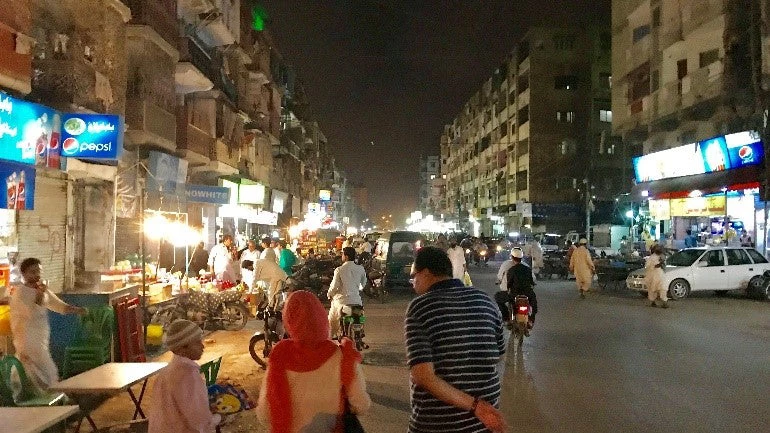
In dense built-up cities like Karachi, Pakistan, public spaces are even more important. These are areas of respite and recreation from the stress of city life. They are also social and cultural spaces where livelihoods and businesses are conducted, especially for the urban poor. Public open spaces in Karachi have suffered from rapid urban growth:
- The total share of green space detectable in satellite imagery has fallen from 4.6% in 2001 to 3.7% in 2013.
- Large tracts of vacant land in prime areas in the city center are closed off to the public and neglected.
- Twelve square kilometers of prime waterfront area, often a valuable public asset in other cities, is still mostly undeveloped more than 10 years after the roads were built.
- Many sidewalks in the main commercial areas and busy corridors are broken down, converted to unregulated parking areas, or used for dumping trash—to the detriment of pedestrian safety and public health.
- In a focus group, women also remarked on the lack of safe playgrounds or other recreational facilities for children.
Illango on Twitter
Here is my colleague, Sohaib Athar talking about #Karachi Neighbourhood Improvement Project: https://t.co/s1BTsv9hst
Beyond the investments in the physical space and urban design, a key design feature of KNIP is its emphasis on active and sustained engagement with the residents of Karachi. The project aims to use a participatory planning process to identify, prioritize, and design highly impactful enhancements to public areas such as sidewalks, open spaces and green spaces, and public buildings. While the exact nature of investments will be determined through community consultations, they may include safety features for pedestrians and other non-motorized transportation, accessibility and mobility improvements close to commercial areas and planned transit stations, new or upgraded neighborhood parks and playgrounds, infrastructure to foster safe and vibrant street activity (kiosks for vendors, tables and seating, temporary street closures for festivals, etc.), measures to address traffic congestion and parking, and improved municipal services in public areas (street lighting, garbage collection, drainage, etc.).
KNIP is intended to be an entry point to showcase the value of participatory planning and inclusive urban design, as the first step in a longer-term strategy for city transformation and rejuvenation. Building confidence and inclusiveness in city management is critical to ensure the success of deeper institutional reforms and larger infrastructure investment programs down the road. KNIP is expected to help lay the foundation for a multi-year partnership between the World Bank Group and the local and provincial governments focused on inclusivity, livability, and prosperity. To this end, KNIP will also support the creation of a Karachi Transformation Steering Committee (KTSC), comprised of elected officials, government representatives, business leaders, community stakeholders and NGOs representing various public interests. KTSC’s mandate is to develop a shared vision for Karachi’s transformation and a roadmap to achieve that vision in an inclusive way.
Related:
- Download report: Transforming Karachi into a Livable and Competitive Megacity
- Subscribe to our Sustainable Communities newsletter
- Follow us on Twitter (@WBG_Cities) and Flipboard





Join the Conversation